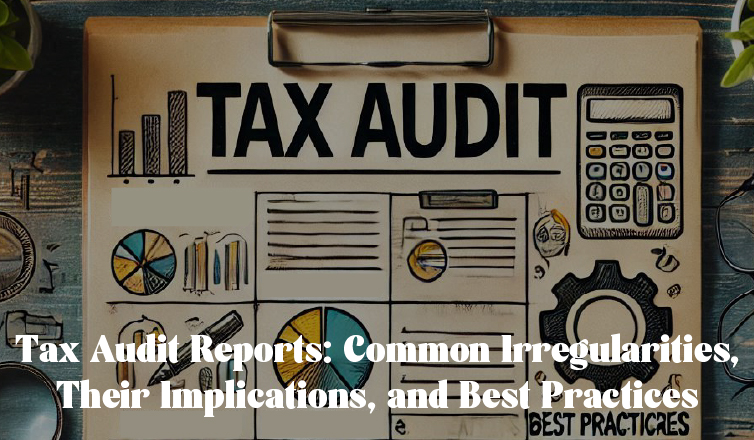Connect with us for all your queries



Tax audits are an essential component of the taxation system, ensuring that businesses comply with the Income Tax Act, 1961, and other relevant regulations. They help maintain transparency and accountability, serving as a crucial tool for identifying discrepancies, errors, and omissions in financial statements. The Tax Audit Report (TAR), filed under Section 44AB, is a cornerstone document that outlines the taxpayer's compliance with various provisions of the Income Tax Act and Goods and Services Tax (GST) laws.
Despite the importance of tax audits, irregularities in these reports are common. These errors can arise from a variety of factors, such as complex tax laws, changes in legislation, and mistakes in reporting. This article delves into the most commonly found irregularities in tax audit reports and provides insights into best practices for addressing these issues.
A Tax Audit Report is a document required to be filed by certain taxpayers under Section 44AB of the Income Tax Act. The primary objective of a tax audit is to verify whether the taxpayer's income and expenses have been correctly reported and whether tax deductions have been properly calculated and remitted. The audit process is carried out by a qualified Chartered Accountant (CA), who provides a detailed report (Form 3CA, 3CB, and 3CD) on the taxpayer’s financials.
Tax audits are mandatory for businesses that exceed a certain turnover threshold, as defined by the Income Tax Act. The audit report provides a detailed breakdown of income, deductions, statutory compliances, and other financial data.
1. Incomplete or Incorrect Reporting of Expenses and Income
One of the most frequent errors in tax audit reports is the incomplete or incorrect reporting of expenses and income. Some common issues include:
2. GST Compliance Issues
Given the complexity of the Goods and Services Tax (GST) framework, irregularities in GST reporting are common. Some of the common mistakes in GST reporting in Tax Audit Reports include:
3. TDS (Tax Deducted at Source) Reporting Errors
TDS is another area where discrepancies are commonly found. Errors in TDS reporting can arise due to:
4. Non-Disclosure of Related Party Transactions
Section 40A(2) of the Income Tax Act mandates that all transactions with related parties be disclosed in the Tax Audit Report. Failure to disclose these transactions can raise suspicions of tax evasion, as such transactions are often used to manipulate profits or avoid taxes. Common issues include:
5. Incorrect Depreciation Reporting
Depreciation is one of the most commonly disputed items during a tax audit. Issues can arise when:
6. Discrepancies in Foreign Transactions and Foreign Exchange Gains/Losses
For businesses involved in international trade, there are several areas where errors can arise:
7. Incorrect Reporting of Other Deductions
The Tax Audit Report requires detailed reporting on various deductions under Chapter VI-A of the Income Tax Act, such as deductions for investments in tax-saving instruments (e.g., PPF, National Savings Certificates). Common errors include:
1. Thorough Documentation and Record-Keeping
A robust system of documentation is essential for error-free tax reporting. Maintain detailed records of transactions, invoices, GST returns, and TDS filings. Ensure that records for both income and expenditures are properly categorized and supported by relevant documentation.
2. Automate Accounting Processes
Using accounting software can minimize human errors in preparing tax audit reports. Many modern solutions have built-in compliance checks for GST, TDS, and income tax, which can automatically flag discrepancies and alert auditors before finalizing reports.
3. Regular Reconciliation of Books and Returns
Perform regular reconciliations between accounting books and statutory returns (such as TDS, GST, and income tax). This helps identify discrepancies early and correct them before filing the tax audit report.
4. Training and Upgrading Knowledge
Auditors and businesses should regularly update their knowledge of the Income Tax Act, GST laws, and relevant amendments. Training programs and workshops can help auditors stay current with changing regulations.
5. Pre-Filing Review by Experts
Before submitting the tax audit report, conduct a detailed review of the document. Involving experts or tax consultants during the review process can help identify any overlooked discrepancies and ensure compliance with all statutory requirements.
Tax audits are vital to ensuring the integrity of financial reporting and compliance with tax laws. However, due to the complexity of tax laws and frequent amendments, errors and omissions in tax audit reports are common. By adopting best practices such as maintaining accurate records, automating accounting processes, and conducting thorough reconciliations, taxpayers can significantly reduce the risk of irregularities. Regular training and expert reviews can also help ensure that tax audits are completed accurately and on time.
By addressing these common irregularities, businesses can avoid penalties, safeguard their reputation, and ensure that they comply fully with tax regulations, thus promoting a culture of transparency and accountability in the financial ecosystem.
Tax Partner is India’s most reliable online business service platform, dedicated to helping you in starting, growing, & flourishing your business with our wide array of expert services at a very affordable cost.